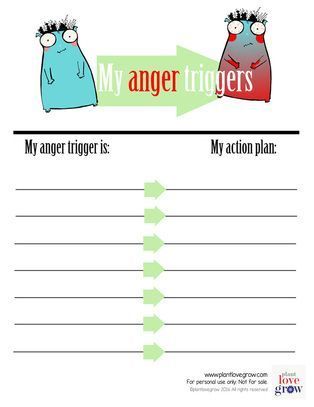10 Anger Triggers to Identify and Manage

Understanding Anger Triggers
Anger is a natural human emotion that everyone experiences at some point in their lives. However, unmanaged anger can lead to negative consequences, affecting our relationships, work, and overall well-being. Identifying and managing anger triggers is crucial to maintaining a healthy and balanced life. In this article, we will explore 10 common anger triggers and provide tips on how to manage them.
Trigger 1: Stress and Overwhelm
Stress and feeling overwhelmed are common anger triggers. When we feel like we have too much on our plate, we can become irritable and short-tempered. Recognize the signs of stress and overwhelm, such as a racing heart, sweating, and difficulty concentrating.
- Take breaks and practice relaxation techniques, such as deep breathing, meditation, or yoga.
- Prioritize tasks and delegate responsibilities when possible.
- Engage in physical activity, like walking or jogging, to release tension.
Trigger 2: Lack of Sleep
Lack of sleep can significantly impact our mood and increase irritability. Most adults need 7-9 hours of sleep per night. Establish a consistent sleep schedule and create a sleep-conducive environment.
- Avoid caffeine, nicotine, and electronic screens before bedtime.
- Create a relaxing bedtime routine, such as reading or taking a warm bath.
- Invest in a comfortable mattress and pillows.
Trigger 3: Frustration and Helplessness
Feeling frustrated and helpless can trigger anger. This can occur when we’re unable to achieve our goals or solve a problem. Identify the source of frustration and try to find alternative solutions.
- Break down complex problems into smaller, manageable tasks.
- Seek support from friends, family, or a therapist.
- Practice self-compassion and acknowledge that it’s okay to make mistakes.
Trigger 4: Disrespect and Condescension
Feeling disrespected or condescended to can trigger anger. Communicate assertively and set clear boundaries.
- Use “I” statements to express feelings and avoid blame.
- Set clear expectations and consequences.
- Practice active listening to avoid miscommunication.
Trigger 5: Physical Discomfort
Physical discomfort, such as hunger, thirst, or pain, can trigger anger. Attend to physical needs and prioritize self-care.
- Eat regular, balanced meals to maintain stable blood sugar levels.
- Stay hydrated by drinking plenty of water.
- Engage in regular exercise to reduce pain and improve mood.
Trigger 6: Social Isolation
Social isolation can lead to feelings of loneliness and anger. Connect with others and build a support network.
- Join a club, group, or volunteer organization to meet new people.
- Schedule regular social activities, such as coffee dates or walks.
- Practice empathy and active listening to strengthen relationships.
Trigger 7: Financial Stress
Financial stress can be a significant anger trigger. Create a budget and prioritize financial goals.
- Track expenses and identify areas for reduction.
- Build an emergency fund to reduce financial stress.
- Seek support from a financial advisor or credit counselor.
Trigger 8: Unrealistic Expectations
Unrealistic expectations can lead to disappointment and anger. Set realistic goals and prioritize self-compassion.
- Break down large goals into smaller, achievable tasks.
- Celebrate successes and acknowledge setbacks.
- Practice self-care and prioritize relaxation.
Trigger 9: Unhealthy Communication Patterns
Unhealthy communication patterns, such as passive-aggressiveness or criticism, can trigger anger. Practice assertive communication and set clear boundaries.
- Use “I” statements to express feelings and avoid blame.
- Set clear expectations and consequences.
- Practice active listening to avoid miscommunication.
Trigger 10: Unresolved Conflict
Unresolved conflict can lead to feelings of anger and resentment. Address conflicts directly and seek resolution.
- Practice active listening and empathy.
- Use “I” statements to express feelings and avoid blame.
- Seek support from a mediator or therapist if necessary.
👍 Note: Identifying and managing anger triggers is a process that takes time and effort. Be patient and compassionate with yourself as you work through these triggers.
As we conclude, it’s essential to remember that managing anger is a journey. By identifying and addressing these common anger triggers, we can reduce stress, improve relationships, and enhance our overall well-being.
What is the most common anger trigger?
+
According to research, stress and overwhelm are among the most common anger triggers.
How can I manage anger triggers?
+
Managing anger triggers involves identifying the source of anger, practicing relaxation techniques, and developing healthy communication patterns. Seek support from friends, family, or a therapist if necessary.
Can anger triggers be prevented?
+
While some anger triggers can be prevented, others may be unavoidable. Practicing self-awareness, stress management, and healthy communication can reduce the likelihood of anger triggers.



